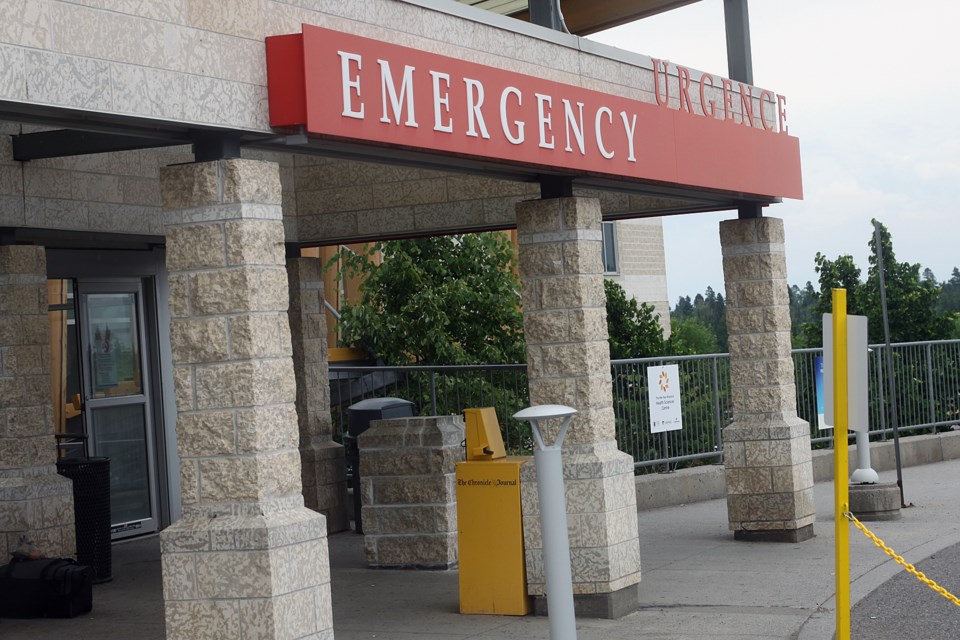THUNDER BAY – Facing one of the highest numbers of mental health and addictions related emergency department visits in Ontario, the regional hospital is considering significant changes that could improve treatment and reduce length of stay.
The Thunder Bay Regional Health Sciences Centre is in the midst of the planning stages for a mental health emergency service, which would provide a separate space for those patients to be assessed and receive care from a specialized professional team.
Dr. Peter Voros, hospital executive vice president of in-patient programs, said last year there were 6,300 emergency department visits related to mental health and substance use, an 11 per cent increase from the previous year. Those visits account for as much as six per cent of all emergency department patients.
“This upward trend has continued for quite some time,” Voros said. “Really, that’s a big part of realizing we have to do things differently. When our emergency was originally built, it wasn’t built to manage that number of people attending with the kinds of needs they are.”
Currently, patients presenting with mental health and substance use issues in the emergency department are either left to wait in limited hallway space or admitted to the adult mental health unit.
Voros acknowledged the needs of mental health patients are much different than those who are at the hospital for physical injuries or illness.
“When you’re in a state of crisis what you need is calm, quiet and support,” Voros said.
“The hallway is not calm and quiet. When people are in a medical state of crisis, the team is moving and moving quickly to meet those needs. That moving around someone who is in a mental health crisis is not helpful. It actually makes the situation for the person in the mental health crisis much worse.”
The planned changes, which would include what Voros described as a small build along with the renovation of existing space, would be noticeable for any patient when they first enter the emergency department.
“Part of this redesign is to hopefully change our triage space altogether to really make it more focused for all patients when they come, not just patients with mental health and substance use issues,” Voros said.
“What we really want to do is give someone a private, confidential space to tell their story of what’s going on whether it’s medical or mental health and addiction related.”
Patients triaged as needing mental health or addictions treatment would be directed to the new mental health emergency service, which would have a separate waiting room and specialized interdisciplinary team.
The redesign would increase the current mental health space “threefold,” Voros said.
“We believe it should meet the needs throughout the day so that everyone can move fairly quickly into a private space to be either with staff or staff and their families to determine what their needs will be,” Voros said. “We’re hoping it will be a very smooth transition for someone coming in to get them into a quiet, private space.”
Another component of the overhaul would be the creation of a new psychiatric stabilization unit, where patients could stay for up to 48 hours under the care of staff while plans are developed for their release.
That unit would be located adjacent to the adult mental health unit on the second floor with the conversion of existing office space.
“There’s a large number of patients who may not need a full admission to hospital but need some time to stabilize, to be assessed and for us to help get them to the community connections they need,” Voros said.
“Many of them need a crisis intervention that is more short-term, really to stabilize and assess whether they need to be admitted for a longer period of time and get them connected to community resources they either may not be connected to now or they may have lost connection with. That short period of time is really that opportunity for us to do that.”
Voros said the enhanced mental health services would require additional nursing staff, likely an addictions clinician specialist and continued psychiatry recruiting.
The process has already involved a full functional program analysis of the emergency space and preliminary architectural designs. Hospital staff are expecting to meet with the North West Local Health Integration Network to discuss operational dollars and an eventual application would be made to the Ministry of Health and Long-Term Care for capital funding.
